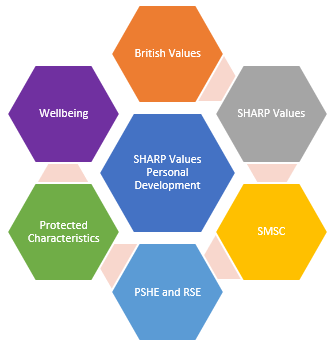Personal Development
At Sharps Copse Primary School, our Personal Development Curriculum encompasses many elements:
- Personal, Social and Health Education(PSHE);
- Relationships and Sex Education(RSE) including drug education, financial education, citizenship, e-safety, personal safety, and the importance of physical activity and diet for a healthy lifestyle;
- Protected Characteristics; the 9 protected characteristics under the Equality Act 2010.
- Social, Moral, Spiritual and Cultural education (SMSC);
- Wellbeing;
- British Values;
- SHARP Values learning behaviours curriculum and their personified characters

The SHARP Values learning behaviours curriculum is a key element of the Personal Development Curriculum at Sharps Copse Primary School. It provides children and adults with a clear, positive framework for developing the key learning behaviours and values of:
- Standards,
- Honesty,
- Attitude,
- Resilience, and
- Pride
There are curriculum targets for each of the strands written for Year R, KS1 and KS2. At Sharps Copse Primary School which progressively structure the values for our whole community. You can read more about the SHARPS Learning Behaviours here
Another key aspect of our Personal Development Curriculum is Wellbeing. We use the 5 Ways of Wellbeing and the PSHE Association’s Thematic Curriculum to explore ways in which we as a school community and individuals can remain ‘connected, keep learning, give, take notice and be active’. Read more about the Ways of Wellbeing here: Postcards, Booklet. Evidence tells us that children with a broad and deep understanding of emotional vocabulary are more likely to be able resolve conflict, articulate how they feel and keep themselves safe so our Personal Development Curriculum includes a strong focus on teaching and learning a progressive, whole school approach to teaching emotional vocabulary.
The aim of the Personal Development Curriculum of Sharps Copse Primary School is to enable our children to become healthy, independent and responsible members of our society. It supports children with their personal and social development, and develops their understanding of the moral, social and cultural aspects of society and life. We provide our children with opportunities for them to learn about rights and responsibilities and appreciate what it means to be a member of a diverse community. Our children are encouraged to develop their sense of self-worth by playing a positive role in contributing to school life and the wider community. Our Personal Development Curriculum is integral to the development of children’s values in order for them to become positive citizens in an ever-changing community.
At Sharps Copse Primary School, we deliver this curriculum by utilising first-hand experience and sharing good practice. However, we are mindful that the planned curriculum must reflect the needs of our pupils. We expect teachers to equip pupils with a sound understanding of risk and with the knowledge and skills necessary to make safe and informed decisions. For further information check our SRE policy and Child-on-Child Abuse Policy in the policies section of the website.
Below you will find some videos for children and articles about our personal Development Curriculum.
School Assemblies

In addition to Personal Development lessons and other parts of school life, school assemblies also play an important part in this aspect of education where children’s spiritual, moral, social and cultural curiosity is stimulated and themes around wellbeing, community and inclusion are explored and nurtured.
We use the SHARP Values Vocabulary Posters to explore ways in which our school SHARP values connect to belonging in our school community, wider community, Britain and beyond. We will often explore and integrate age-appropriate knowledge and understanding of the protected characteristics in assemblies.
Each week, we celebrate the children who have been role models in displaying the Sharps Copse Values in our celebration assembly and importantly discuss how they achieved it so other children can also work towards being celebrated. Please see the ‘Celebrations’ tab on our website.
